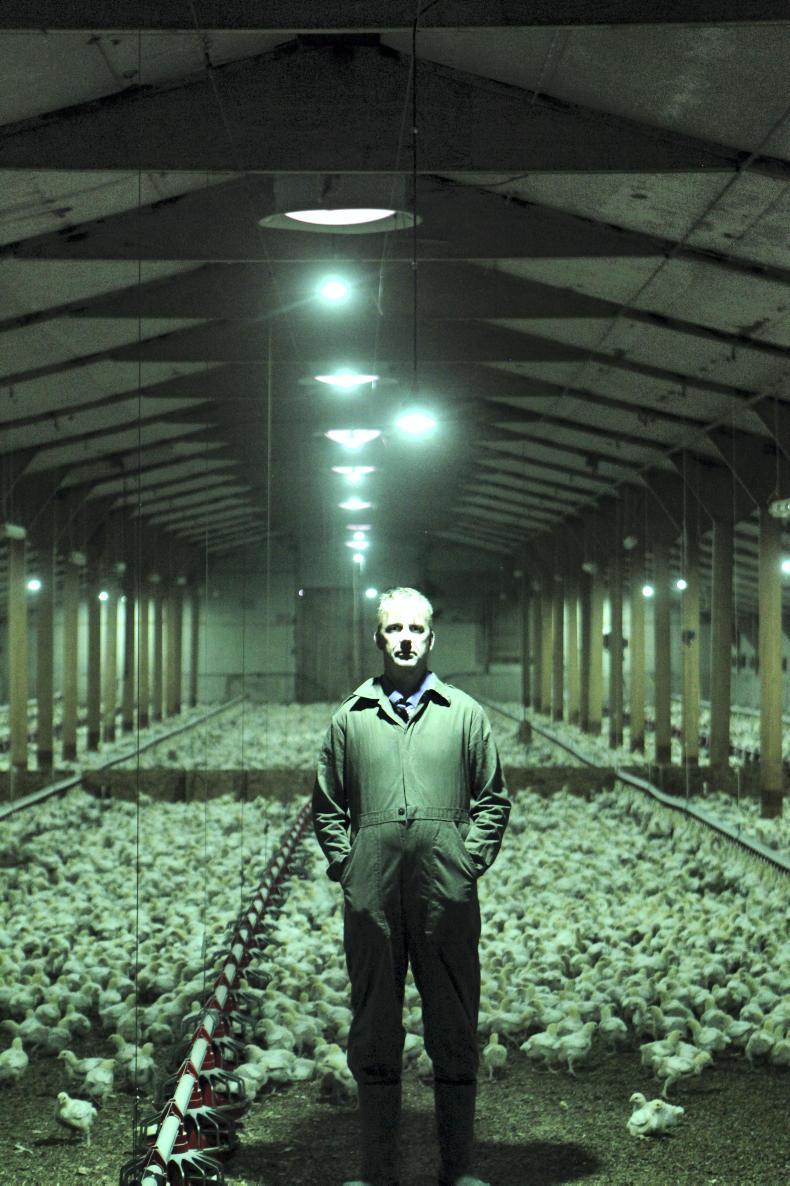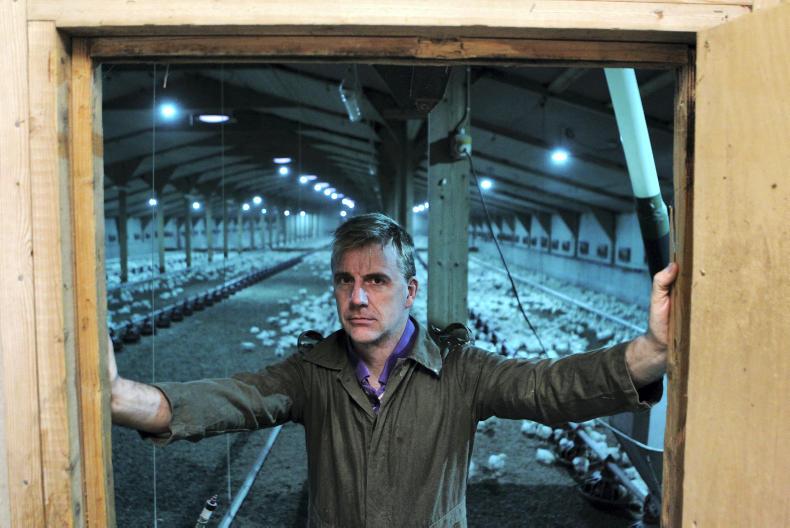“It is all about the money. That is the reality. It is about covering the cost of production and the margin you make. It is about getting paid for what you are doing. At the end of the day you can talk about this and that, but without a profit you are going nowhere.”
Nigel Renaghan is not a man to pull punches. The chair of the IFA poultry committee since 2013, his time at the helm has seen significant changes to an industry that is capital intensive.
According to the Monaghan native, the last three years have seen the poultry industry throw off the shackles and begin an expansion which is set to continue as long as the reputation it has built is maintained. That is, of course, the simplified version of a complicated industry outlook. With tastes and preferences ever-changing, the more health-conscious consumer has driven a demand for poultry products across Europe, something Renaghan believes has been a massive boost.
Expansion
“The Irish poultry industry is going through a period of expansion in every sector and the last two years has really seen it take off. We have seen huge expansion in the commercial broiler trade. Organic eggs are like hens’ teeth. We are seeing major opportunities in free-range eggs,” Renaghan said.
“All you have to do is look at the statistics in Europe. The poultry industry is growing by 1.5% to 2% every year. Compare this with other industries in agriculture such as beef and sheep and it is a major positive.”

Exports of Irish poultry were valued at €275m in 2016 but, despite Renaghan’s optimism, poultry suffered a fall of 14% in export value, predominantly due to lower prices and an unfavourable exchange rate in key markets.
At farm level, the IFA poultry chair places emphasis on education within the sector. “I mean we want a new generation of poultry farmers to come on board and recognise that entering into poultry, while it may be costly, is a great way to diversify your farming enterprise. Educating young farmers on this is vital. There is a new poultry course which is due to be available to students in the fourth quarter of this year in Ballyhaise College, which will be great for young farmers interested in entering the industry. We have gone 15 to 20 years without a poultry course and this is a great boost to the industry.”
The avian influenza of late 2016 and early 2017 presented another challenge to the poultry industry. The 46-year-old believes vigilance is required from unregistered poultry owners.
“Look, a word of warning is needed here. For those people who have unregistered backyard flocks, I would plead with them to register their flocks with the Department. Otherwise, they are increasing the risks of future outbreaks. If future outbreaks enter our commercials flocks, it would have devastating effects.”
Renaghan is also aware of the competition element within the EU and beyond. Production across all member states rose by 3% in 2016, with the broiler and turkey industry seeing the greatest increase. Last year also saw a rise of imports into the EU from the likes of Thailand (6% increase) and Brazil (2% increase). However, it is the recent contaminated poultry meat from Brazil refused by the EU that Renaghan has expressed his greatest reservations about.
“The meat that has come into Europe that was contaminated with salmonella was poultrymeat. There is this preconceived idea that this was beef, but it was not. The poultry sector should not be jeopardised by this substandard inferior product from outside of the EU,” he said.
Renaghan claims up to 500,000t of poultrymeat has entered the EU from Brazil in 2016. He believes this represents a far greater problem than the 136,000t of beef imported into the EU from the South American country.
He has also recognised competition from within the island of Ireland itself.
The “Cash for Ash” scheme which offered major incentive for farmers in the North to change from burning fossil fuels to biomass such as wood burning gave Northern competitors an edge, according to Renaghan. He wants to see a fair REFIT tariff introduced for poultry farmers down south. A “level playing field”, as he said himself.
“Obviously we don’t want a Cash for Ash scheme, but we would like a reasonable REFIT tariff. That’s one of the goals I set when I first took up my position,” he explained.
Unpredictable
Food markets can be unpredictable, but Renaghan is positive about the outlook for the poultry sector.
He praised TAMS for the support is gives to farmers, but believes poultry and pig farmers should be able to avail of a limit of €300,000 rather than the current €80,000. He is confident markets in the EU in the future will be favourable to the Irish poultry sector. He hopes any future outbreaks of influenza do not affect commercial flocks.
Renaghan’s three main aims when he took up office in the IFA were “to get poultry farmers money, to get poultry farmers TAMS and to get poultry farmers renewable heat incentive for biomass”.
So far, he is happy with the results. But he stops short at “job complete” and settles at “a lot done, a lot more to do”. One has to be realistic in agriculture.
Read more
Moy Park - the rise of a poultry giant
“It is all about the money. That is the reality. It is about covering the cost of production and the margin you make. It is about getting paid for what you are doing. At the end of the day you can talk about this and that, but without a profit you are going nowhere.”
Nigel Renaghan is not a man to pull punches. The chair of the IFA poultry committee since 2013, his time at the helm has seen significant changes to an industry that is capital intensive.
According to the Monaghan native, the last three years have seen the poultry industry throw off the shackles and begin an expansion which is set to continue as long as the reputation it has built is maintained. That is, of course, the simplified version of a complicated industry outlook. With tastes and preferences ever-changing, the more health-conscious consumer has driven a demand for poultry products across Europe, something Renaghan believes has been a massive boost.
Expansion
“The Irish poultry industry is going through a period of expansion in every sector and the last two years has really seen it take off. We have seen huge expansion in the commercial broiler trade. Organic eggs are like hens’ teeth. We are seeing major opportunities in free-range eggs,” Renaghan said.
“All you have to do is look at the statistics in Europe. The poultry industry is growing by 1.5% to 2% every year. Compare this with other industries in agriculture such as beef and sheep and it is a major positive.”

Exports of Irish poultry were valued at €275m in 2016 but, despite Renaghan’s optimism, poultry suffered a fall of 14% in export value, predominantly due to lower prices and an unfavourable exchange rate in key markets.
At farm level, the IFA poultry chair places emphasis on education within the sector. “I mean we want a new generation of poultry farmers to come on board and recognise that entering into poultry, while it may be costly, is a great way to diversify your farming enterprise. Educating young farmers on this is vital. There is a new poultry course which is due to be available to students in the fourth quarter of this year in Ballyhaise College, which will be great for young farmers interested in entering the industry. We have gone 15 to 20 years without a poultry course and this is a great boost to the industry.”
The avian influenza of late 2016 and early 2017 presented another challenge to the poultry industry. The 46-year-old believes vigilance is required from unregistered poultry owners.
“Look, a word of warning is needed here. For those people who have unregistered backyard flocks, I would plead with them to register their flocks with the Department. Otherwise, they are increasing the risks of future outbreaks. If future outbreaks enter our commercials flocks, it would have devastating effects.”
Renaghan is also aware of the competition element within the EU and beyond. Production across all member states rose by 3% in 2016, with the broiler and turkey industry seeing the greatest increase. Last year also saw a rise of imports into the EU from the likes of Thailand (6% increase) and Brazil (2% increase). However, it is the recent contaminated poultry meat from Brazil refused by the EU that Renaghan has expressed his greatest reservations about.
“The meat that has come into Europe that was contaminated with salmonella was poultrymeat. There is this preconceived idea that this was beef, but it was not. The poultry sector should not be jeopardised by this substandard inferior product from outside of the EU,” he said.
Renaghan claims up to 500,000t of poultrymeat has entered the EU from Brazil in 2016. He believes this represents a far greater problem than the 136,000t of beef imported into the EU from the South American country.
He has also recognised competition from within the island of Ireland itself.
The “Cash for Ash” scheme which offered major incentive for farmers in the North to change from burning fossil fuels to biomass such as wood burning gave Northern competitors an edge, according to Renaghan. He wants to see a fair REFIT tariff introduced for poultry farmers down south. A “level playing field”, as he said himself.
“Obviously we don’t want a Cash for Ash scheme, but we would like a reasonable REFIT tariff. That’s one of the goals I set when I first took up my position,” he explained.
Unpredictable
Food markets can be unpredictable, but Renaghan is positive about the outlook for the poultry sector.
He praised TAMS for the support is gives to farmers, but believes poultry and pig farmers should be able to avail of a limit of €300,000 rather than the current €80,000. He is confident markets in the EU in the future will be favourable to the Irish poultry sector. He hopes any future outbreaks of influenza do not affect commercial flocks.
Renaghan’s three main aims when he took up office in the IFA were “to get poultry farmers money, to get poultry farmers TAMS and to get poultry farmers renewable heat incentive for biomass”.
So far, he is happy with the results. But he stops short at “job complete” and settles at “a lot done, a lot more to do”. One has to be realistic in agriculture.
Read more
Moy Park - the rise of a poultry giant







 This is a subscriber-only article
This is a subscriber-only article












SHARING OPTIONS: